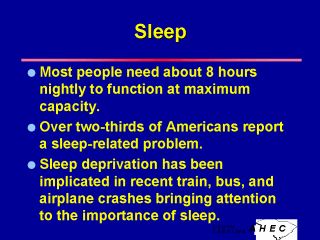 |
Sleep
Deprivation
While sleep has not as yet been shown to be a direct contributor to chronic
disease, it is being acknowledged as an important aspect of health. Studies show that
individuals who sleep less than 6 or more than 10 hours on a regular basis, have a lower
life expectancy that those who get between 6-10 hours nightly.
Well over half of American adults report having a sleep-related problem. Using
alcohol as a sleep aid actually tends to result in more waking episodes during the night
so it is not recommended to help non-sleepers. Consequences of being sleep-deprived
include:
- Daytime sleepiness
- Irritability
- Difficulty dealing with stress and conflict
- Reduced productivity
- Drowsy driving
Sleep deprivation has been implicated in recent train, bus, and airplane crashes.
So while it may seem trivial to some, getting enough sleep may become a significant issue
because of health and accident prevention. |
